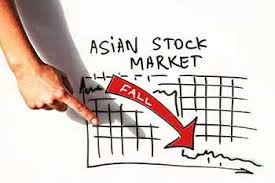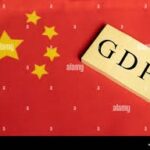
- July 22, 2024
- By: Admin1_blog
- Asia Market, Indices

Lim Hui Jie
KEY POINTS
- U.S. President Joe Biden announced his withdrawal from the 2024 presidential race, endorsing Vice President Kamala Harris.=
- Traders return to the markets after machines running Microsoft’s Windows operating system crashed Friday due to a glitch in an update issued by cybersecurity company CrowdStrike. Shares of CrowdStrike plunged 11% on Friday.
- China’s loan prime rate will be releases later in the day, with the one- and five-year LPR expected to be unchanged, according to economists polled by Reuters.
Asia-Pacific markets fell on Monday, as news emerged that U.S. President Joe Biden had dropped out of the presidential race and endorsed Vice President Kamala Harris as the Democratic nominee.
On Monday, China’s central bank unexpectedly cut rates, with the short term 7-day reverse repurchase rate lowered to 1.7% from 1.8%.
The one-year and five-year loan prime rates were also trimmed by 10 basis points each to 3.35% and 3.85% respectively, surprising markets as economists were not expecting any change. The People’s Bank of China will also reduce collateral requirements for its medium-term lending facility from July. The current MLF rate stands at 2.5%.
A survey by Reuters last week showed that 64% of all respondents expected both the one-year and five-year LPR to stay unchanged.
The one-year LPR acts as the benchmark for most corporate loans, and the five-year LPR serves as a reference rate for mortgages.
Hong Kong’s Hang Seng index rose 0.8% after the PBOC’s announcement, while the mainland Chinese CSI 300 lost 0.72%.
Investors will also assess the impact of the massive global IT outage late last week. Machines running Microsoft’s Windows operating system crashed Friday due to a glitch in an update issued by cybersecurity company CrowdStrike, causing its shares to plunge by 11%.
Microsoft said in a blog post on the weekend it estimated that 8.5 million Windows devices — or less than 1% of all Windows machines — were affected.
This week, investors will be looking out for GDP data from South Korea and the U.S., as well as factory activity data from around the region. South Korea and the the U.S will announce second-quarter advance GDP numbers on Thursday.
Other economic data this week include inflation numbers from the U.S. and Singapore on Friday and Tuesday, respectively.
| TICKER | COMPANY | NAME | PRICE | CHANGE | %CHANGE |
|---|---|---|---|---|---|
| .N225 | Nikkei 225 Index | *NIKKEI | 39531.6 | -532.19 | -1.33 |
| .HSI | Hang Seng Index | *HSI | 17560.47 | 142.79 | 0.82 |
| .AXJO | S&P/ASX 200 | *ASX 200 | 7917.9 | -53.7 | -0.67 |
| .SSEC | Shanghai | *SHANGHAI | 2961.13 | -21.18 | -0.71 |
| .KS11 | KOSPI Index | *KOSPI | 2756.46 | -39 | -1.4 |
| .FTFCNBCA | CNBC 100 ASIA IDX | *CNBC 100 | 9896.57 | -102.91 | -1.03 |
The Taiwan Weighted Index led losses in the region, tumbling 2.7%, dragged by industrial and tech stocks.
Japan’s Nikkei 225 fell 1.11%, while the broad-based Topix was down 1%. This was the first time in three weeks that the Nikkei dipped below the 40,000 mark.
South Korea’s Kospi was 1.44% lower, while the small-cap Kosdaq saw a larger loss of 2.52%.
Australia’s S&P/ASX 200 dropped 0.66%.
On Wall Street, all three major indexes retreated on Friday and U.S. stock markets wrapped up the week defined by a rotation out of this year’s mega cap winners in favor of smaller names.
The S&P 500 dropped 0.71%, while the tech heavy Nasdaq Composite slid 0.81%. The Dow Jones Industrial Average fell 377.49 points, or 0.93%, to 40,287.53.
Source : cnbc



